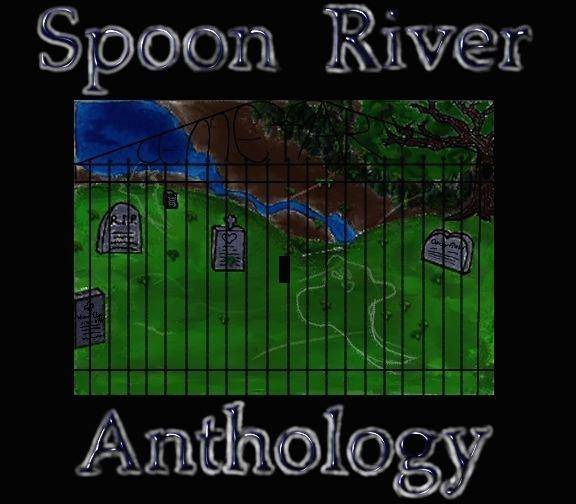 Just about a century ago, Edgar Lee Masters published his Spoon River Anthology, a collection of dramatic monologues set in the fictional, but very real, community of Spoon River, Illinois. More accurately, the poems grew from the town’s graveyard, individuals giving voice to their own lives after their deaths. While individual lives and voices stand out, the overall effect is a pointed, critical, yet not entirely negative view of small town Midwestern life near the end of the 19th century.
Just about a century ago, Edgar Lee Masters published his Spoon River Anthology, a collection of dramatic monologues set in the fictional, but very real, community of Spoon River, Illinois. More accurately, the poems grew from the town’s graveyard, individuals giving voice to their own lives after their deaths. While individual lives and voices stand out, the overall effect is a pointed, critical, yet not entirely negative view of small town Midwestern life near the end of the 19th century.
Drawn from Masters’ own youth in Lewistown and Petersburg, the nearly 250 poems got the poet in a fair share of trouble with the locals. But by the time they appeared in print, Masters had moved on to Chicago to practice law. An almost equally forgotten, yet important poet of the era, Amy Lowell commented on Masters’ portraits: “One wonders, if life in our little Western cities is as bad as this, why everyone does not commit suicide.”
Still, based in part on the model of the Greek Anthology, the work was a modernist phenomenon, with claims that it was as important and influential as poetry by William Carlos Williams, Wallace Stevens, H. D., Ezra Pound, and T. S. Eliot, who published the most famous monologue of that fertile time in American literature, “The Love Song of J. Alfred Prufrock.” Sherwood Anderson’s Winesburg, Ohio, Thornton Wilder’s Our Town, and the novels of Theodore Dreiser also converse profitably with Masters’ masterpiece.
For several reasons, I love this flawed, uhneven book. Like many young readers, the voices of Lucinda Matlock (“it takes life to love life”) and Anne Rutledge (the one spurned by Lincoln) showed up in middle school and high school literature classes. We got to write our own monologues in response. It was good to imagine voices and worlds inside of others. Sometimes it was good to imagine certain other folks dead and full of regret. Someone nearly always wrote about the English teacher. More of us wrote about our own grandparents, neighbors. Imaginative fury and sympathy was hard to test in a standardized way, but it balances out the sentence diagrams.
Later, encountering these voices in total, I discovered that, on their own, characters as “types” could bear little scrutiny. The crooked judge, the failed and frustrated poets, the bitter wives, and the spurned outsiders were names in name only. Masters inhabited many of his ghosts with less sympathy and less complexity than others. It’s a sentimental work, in the sense of both preciousness and easy anger. Too often, Masters likes to tell a reader exactly how she should feel. But humor leavens this tendency. I like all the ways people die—smoking Red Eagle cigars, lockjaw from a needle in the hand while sewing a baby’s clothes, experimenting with pharmaceuticals—it’s a riot.
Still, collectively these selves resonate with one another and with their place along the river. Spoon River Anthology levels out the follies, worries, and slim, joyful moments of living, bringing us again and again to the sobering norm that “The weak of will, the strong of arm, the clown, the boozer, the fighter / All, all, are sleeping on the hill.” In the fragmented world of the early 20th century (and now the early 21st) it couldn’t hurt to be reminded that memory and mortality might be more collective than we typically think when, in the words of Griffey the Cooper, “You are submerged in the tub of yourself.“
Never coming close again to the success (or scandal) of the anthology, Masters continued to write, publishing some 57 books of poetry, biography, plays, including a much less successful sequel to Spoon River. For those of us who have spent our lives in the gossip-swirl, lore, and privacy of small churches, taverns, schools, and neighborhoods, especially those of Illinois, Masters’ voice can still bow the pleasurable strings of righteous judgment and vindictive humor and, more valuably empathic, imaginative sympathy.
And for those of us trying to learn to live more fully in flawed places, the first lines of Fiddler Jones’ epitaph offer some hope: “The earth keeps some vibration going / There in your heart, and that is you. / And if the people find you can fiddle, / Why, fiddle you must, for all your life.” Fiddle away, I say.








